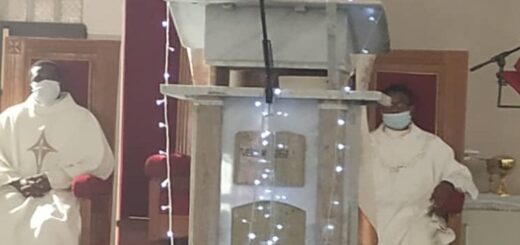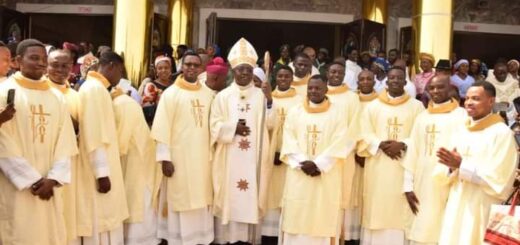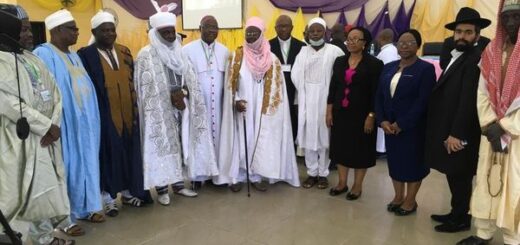Marriage and Family in Contemporary Society
by ARCH BISHOP · November 9, 2023
4th Abuja Archdiocesan General Assembly, Opening Address by Most Rev. Ignatius A. Kaigama, Archbishop of Abuja, 9th November, 2023.
Theme: Marriage and Family in Contemporary Society
Introduction
Our 4th Annual General Assembly of the Catholic Archdiocese of Abuja has kicked off with the opening Mass. I am very happy to welcome you all to the Assembly. It is now a tradition to convoke this yearly assembly in order to meet, pray, interact and share our experiences of spiritual and pastoral progress and challenges among delegates drawn from the lay faithful from parishes, pastoral areas and chaplaincies
as well as heads of church societies, representatives of the religious congregations and indeed the clergy. I welcome you our distinguished guests and all the priests, religious and lay faithful, especially those who have recently joined our Archdiocese.
This year we are holding our Assembly in November, a providential period, coming immediately after the just concluded one-month 16th Ordinary General Assembly of the Synod of Bishops in Rome, of which I was privileged to be a part of.
It is gratifying to note that our theme for the Assembly focuses on Marriage and the family, a topic which was also much discussed during the Synod, at a time when marriage and family are threatened by modern-day gender ideologies and other secular influences. The family as a community of life and love is a privileged place of education in faith and Christian practice. Parents and grandparents and all those who live and share their faith, cultural and moral values in the family are the first missionaries.
Our Assembly is a sort of a mini synod. The word “synod” comes from the Greek “synodos,” let us walk [together]. That was the reason why we initiated this annual Assembly so that in the Federal Capital Territory (FCT), despite our ethnic diversity and places of origin, social status, etc., we can continue to walk together in faith to create an atmosphere in our church family where everybody has a chance to
participate and contribute, where nobody is irrelevant.
Marriage in the Catholic Church
Marriage is an institution ordained by God at the beginning of creation, whereby a man leaves his father and mother and is united with his wife, and the two become one flesh (cf. Gen 2:24). The Catholic Church teaches that marriage is a union between a man and woman which by its nature is geared towards the good of the spouses and for the procreation and education of offspring (cf. Can. 1055 $1). Marriage is in fulfilment of the scriptural command of God to be fruitful, multiply and fill the earth (Gen 1:27-28). Pope John Paul II, in Familiaris Consortio of November 22, 1981, reminds us that “It must not be forgotten however that, even when procreation is not possible, conjugal life does not for this reason lose its value. Physical sterility in fact can be for spouses the occasion for other important services to the life of the human person, for example, adoption, various forms of educational work, and assistance to other families and to poor or handicapped children” (FC 14).
Whether it is from Scripture, patristic fathers, the Vatican II Council document, Pope Paul V1’s Encyclical ‘Humanae Vitae’ or Pope John Paul II’s Apostolic Exhortation, ‘Familiaris Consortio,’ marriage is described as a love that differs from other kinds of human love. It includes the whole of the other person as a human, sexual, procreative being, sexually complementary in nature. Familiaris Consortio describes the nature of this love as a totality which involves all the elements of the person and aims at a deep and personal unity that leads to forming one heart and soul; it demands indissolubility and faithfulness in definitive mutual giving and is open to children (FC 13). It is a permanent and exclusive union, and should be a “domestic church,” a community of faith, hope and charity.
Marriage and Family in Contemporary Society
There is no gain saying that in our contemporary society, marriages and Christian families are faced with numerous challenges due to secularism, influence of the social media, materialism, consumerism, and relativism, resulting in an increasing number of broken homes and single parenting. While some families struggle to rise above these challenges by remaining faithful to the traditional Christian values, others are confused and obviously uncertain of the real meaning of that union to which they are called to share.
The family is the first and vital cell of society. A society is only as healthy, as stable, as energetic, and as imbued with moral values as its families. A nation can be strong so long as its families are strong. A nation can be said to be crumbling if its families are falling apart and riddled with moral decay. The existence of good families is essential for the existence of the society. Pope John Paul II teaches that the family is the core of all society. For this reason, policies must be adopted which protect and promote the family, the school of social virtues. While national issues of politics, governance, economy, and climate change are on the front burner, we must not forget that the family, the nucleus of the nation, is seriously in danger of breakdown.More than allocating grants and palliatives, families need to be empowered and supported by government to embark on sustainable entrepreneurial activities.
We hope that the 5 billion Naira palliative allocated by our President to each state and the FCT to cushion the effects of the fuel subsidy removal, and the N25,000 monthly grant, allocated to 15 million struggling Nigerian families from October –December 2023, will truly get into the hands of these poor and vulnerable people. We hope too that the fundamental causes of family breakdown, divorce, cases of domestic violence, lack of care for the sick and the elderly, etc., will be investigated and remedied by our government.
On their part, families must see to it that its members are patriotic and law abiding. It is disturbing to observe that the perpetrators of violence, cybercrime, kidnapping, etc., are sometimes young people indoctrinated by criminals and enemies of the state. One is left to wonder if these young people belong to families.
Abuja Archdiocesan Guidelines for Marriage
The practical guidelines for marriage, prepared by the Family and Human Life Commission of the Archdiocese in collaboration with the Gaudium et Spes Institute make very strong recommendations concerning marriage and family life. It enlightens us about courtship/dating, registration and pre-nuptial investigation, payment of dowry/bride wealth, publication of banns, mixed marriage and so on. I thereby enjoin the Commission, headed by Sir. Dan Okekenta to continue to promote the family as a domestic church and to promote proper home training of children, for a healthy family makes a healthy Church and by extension a healthy society.
Model Family of Nazareth
As a model of family life, the Church constantly places before us the Holy Family of Nazareth: Jesus, Mary, and Joseph, urging us to strive towards becoming faithful disciples of Christ, and exemplary models of faith in the Church and society. Let us not forget that the family as a domestic church is also a “school of synodality,” and so we must recommit ourselves to the task of family renewal.
Conclusion
Before I conclude my address, permit me to thank and commend the planning committee of this 4th General Assembly, ably chaired by Rev. Fr. Christopher Damina, for their efforts and dedication in organizing the assembly. Our great thanks to the guest speakers, Sir Daniel Achimugu and Professor Epiphany Azinge, and to all those who supported the assembly in different ways.
As I wish us all fruitful, enriching and spirit-filled deliberations, in God’s name I now declare our 4th Abuja Archdiocesan General Assembly officially open.




